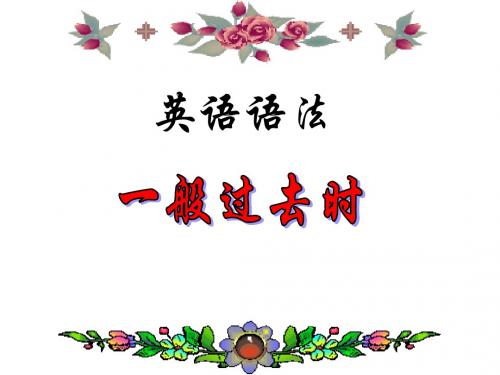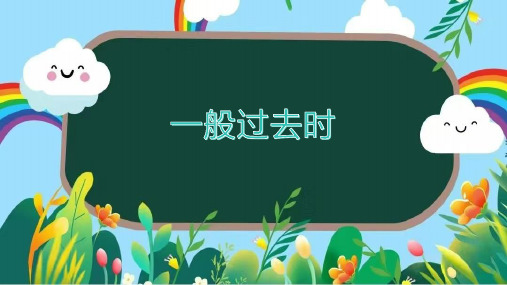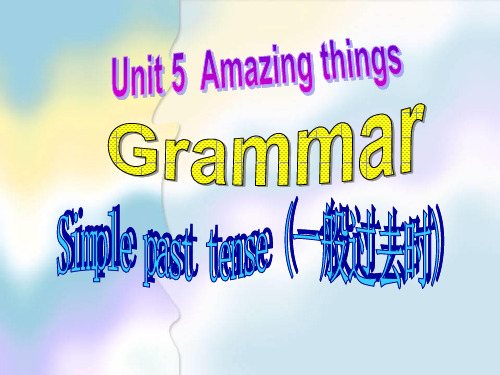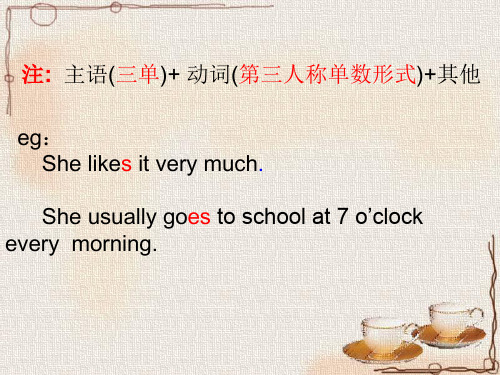一般过去时课件(PPT)
合集下载
一般过去时学习ppt课件

Lucy __d_id_n_’_t_ ___d_o___ her homework at home. 2、He found some meat in the fridge.(变一般疑问句)
__D_i_d__ he __f_in_d_ ___a_n_y_ meat in the fridge? 3、She stayed there for a week.(对划线部分提问)
2、His father worked all day last Monday.(改一般疑问句) __D_i_d__his father ___w_o_r_k__ all day last Monday?
3、 I was very busy last week. (改否定句和一般疑问句) I __w__as_n_’_t_ very busy last week. _W__er_e_ you very busy last week?
2. 结尾是 e 的动词加 -d
3. 末尾只有一个辅音字母的重读 闭音节词,先双写这个辅音字 母,再加-ed
look play start live hope use
stop plan trip
looked played started lived hoped used
stopped planned tripped
/t/ /d/ 之后念 /id/ , 即 ed 在 /t/ /d/ 音后面念 /id/
例:wanted shouted needed counted
“雪亮工程"是以区(县)、乡(镇) 、村( 社区) 三级综 治中心 为指挥 平台、 以综治 信息化 为支撑 、以网 格化管 理为基 础、以 公共安 全视频 监控联 网应用 为重点 的“群 众性治 安防控 工程” 。
一般过去时.语法讲解PPT

时间状语不同
一般过去时常用的时间状语包括过去的时间点、过去的时间段 等,而过去完成时常用的时间状语包括“已经”、“之前”等
。
05
一般过去时的练习与巩固
填空练习
总结词
填空练习是巩固一般过去时的有效方法,通过在句子中留空,让学生填写正确的动词时态,加深对一般过去时的 理解和运用。
详细描述
在填空练习中,教师可以选择一些包含一般过去时的句子,故意去掉动词时态部分,让学生根据上下文语境和时 态规则填写正确的时态。例如,“Yesterday, I ____(go) to the park with my family. We ____ (have) a great time.” 学生应该填写“went”和“had”。
表示过去的习惯或经常发生的动作
描述过去的习惯
一般过去时可以用来描述过去经常发 生的动作或习惯,例如“He used to smoke a pack of cigarettes a day” (他以前每天抽一包烟)。
描述过去的频率
一般过去时可以用来表示过去某个时间 段内发生的动作的频率,例如“We met every week”(我们每周见面一 次)。
一般过去时表示动作已经完成,而过去进行时则表示动作正在进行中。
总结词
时间状语不同
详细描述
一般过去时常用的时间状语包括过去的时间点、过去的时间段等,而 过去进行时常用的时间状语包括“当时”、“正在”等。
与过去完成时混淆的用法
总结词 详细描述
总结词 详细描述
动作是否完成
一般过去时表示动作已经完成,而过去完成时则表示在过去的 某个时间点之前已经完成的动作。
选择练习
总结词
选择练习是一种常见的练习方式,通过提供多个选项,让学生选择符合语境和语法规则的答案,进一 步巩固一般过去时的运用。
一般过去时常用的时间状语包括过去的时间点、过去的时间段 等,而过去完成时常用的时间状语包括“已经”、“之前”等
。
05
一般过去时的练习与巩固
填空练习
总结词
填空练习是巩固一般过去时的有效方法,通过在句子中留空,让学生填写正确的动词时态,加深对一般过去时的 理解和运用。
详细描述
在填空练习中,教师可以选择一些包含一般过去时的句子,故意去掉动词时态部分,让学生根据上下文语境和时 态规则填写正确的时态。例如,“Yesterday, I ____(go) to the park with my family. We ____ (have) a great time.” 学生应该填写“went”和“had”。
表示过去的习惯或经常发生的动作
描述过去的习惯
一般过去时可以用来描述过去经常发 生的动作或习惯,例如“He used to smoke a pack of cigarettes a day” (他以前每天抽一包烟)。
描述过去的频率
一般过去时可以用来表示过去某个时间 段内发生的动作的频率,例如“We met every week”(我们每周见面一 次)。
一般过去时表示动作已经完成,而过去进行时则表示动作正在进行中。
总结词
时间状语不同
详细描述
一般过去时常用的时间状语包括过去的时间点、过去的时间段等,而 过去进行时常用的时间状语包括“当时”、“正在”等。
与过去完成时混淆的用法
总结词 详细描述
总结词 详细描述
动作是否完成
一般过去时表示动作已经完成,而过去完成时则表示在过去的 某个时间点之前已经完成的动作。
选择练习
总结词
选择练习是一种常见的练习方式,通过提供多个选项,让学生选择符合语境和语法规则的答案,进一 步巩固一般过去时的运用。
一般过去时(公开课)课件

表达过去的经验或习惯
一般过去时也可以用来表达过去的经验或习惯,例如“他以前是一 名教师”表示过去的经验。
描述历史事件
在描述历史事件时,一般过去时也是常用的时态,例如“二战期间 ,德国侵略了许多国家”。
表示过去的推测或假设
表达对过去的推测
一般过去时可以用来表达对过去的推 测,例如“如果当时听了医生的话, 现在可能已经康复了”表示对过去的 推测。
表达假设条件 在假设条件下,一般过去时也可以用 来描述过去的事情,例如“假如我早 一点起床,就不会迟到了”表示假设 条件下的过去动作。
05
一般过去时的实际应 用
在日常对话中的应用
总结词
表达过去的经历和事件
详细描述
在日常生活中,当我们想要描述过去发生的事情或经历时,一般过去时是非常 常用的。例如,“昨天我去看了电影”或“上个星期我们去了海边”。
THANK YOU
表示过去的经验、观察、想法 或情感。
用于描述历史事件或故事,强 调其发生的时间和背景。
02
一般过去时的动词变 化
规则动词的一般过去时变化
01
规则动词的过去时形式通常是在 动词原形后面加-ed,例如: play-played,write-wrote。
02
有些规则动词的过去时形式有音 形的变化,例如:write-wrote, buy-bought,run-ran。
助动词Did+主语+动词原形+其他成分
句型结构的变换
主动语态变被动语态
一般疑问句的回答
主语+助动词was/were+动词过去分 词+其他成分
Yes/No,主语+did/didn't+动词原 形+其他成分
一般过去时也可以用来表达过去的经验或习惯,例如“他以前是一 名教师”表示过去的经验。
描述历史事件
在描述历史事件时,一般过去时也是常用的时态,例如“二战期间 ,德国侵略了许多国家”。
表示过去的推测或假设
表达对过去的推测
一般过去时可以用来表达对过去的推 测,例如“如果当时听了医生的话, 现在可能已经康复了”表示对过去的 推测。
表达假设条件 在假设条件下,一般过去时也可以用 来描述过去的事情,例如“假如我早 一点起床,就不会迟到了”表示假设 条件下的过去动作。
05
一般过去时的实际应 用
在日常对话中的应用
总结词
表达过去的经历和事件
详细描述
在日常生活中,当我们想要描述过去发生的事情或经历时,一般过去时是非常 常用的。例如,“昨天我去看了电影”或“上个星期我们去了海边”。
THANK YOU
表示过去的经验、观察、想法 或情感。
用于描述历史事件或故事,强 调其发生的时间和背景。
02
一般过去时的动词变 化
规则动词的一般过去时变化
01
规则动词的过去时形式通常是在 动词原形后面加-ed,例如: play-played,write-wrote。
02
有些规则动词的过去时形式有音 形的变化,例如:write-wrote, buy-bought,run-ran。
助动词Did+主语+动词原形+其他成分
句型结构的变换
主动语态变被动语态
一般疑问句的回答
主语+助动词was/were+动词过去分 词+其他成分
Yes/No,主语+did/didn't+动词原 形+其他成分
一般过去时讲解PPT课件

Yes,you did.
Yes,I did. Yes,he/she/it did.
No,you did not. No, I did not. No,he/she/it did not.
work Did we work?
Did you work? Did they work?
Yes,we/you did. Yes,we did. Yes,they did.
grow -- grew know -- knew throw -- threw blow -- blew write -- wrote drive -- drove ride -- rode get -- got forget -- forgot lend -- lent send -- sent spend -- spent say -- said */sed/ pay -- paid stand -- stood understand -- understood let -- let put -- put cut -- cut read -- read2*0
.
1
1.定义:
(用法一) 一般过去时态表示过去某个时间发生的动 作或存在的状态,常和表示过去的时间状语连用;
eg:I got up at 7:00 yesterday.
My father was at work yesterday afternoon
(用法二) 也表示过去经常或反复发生的动作,常和 表示频度的时间状语连用。
写出下列动词的过去式:
go
went
use
think thought live
be
was/ were wake
happen happened keep
一般过去时态ppt课件

2、表示过去经常或反复发生的动作。 My father often went to work by bus last year. When I was a child, I often listened to music.
可编辑课件PPT
9
6.练习
1.They_w_e_re(be) doctors last year. 2.You _h_a_d(have) a class this morning. 3.She_ra_n_ (run) very fast yesterday.
passed cooked
2、元浊 /d/ ,即 ed 在元音,浊辅音后面念 /d/ ,
例:borrowed enjoyed
called moved
3、/t/ /d/ 之后念 /id/ , 即 ed 在 /t/ /d/ 音后面念 /id/
可编辑课件PPT
例:wanted shouted needed counted6
4.一般过去时的否定和一般疑问句 1)We had a good time yesterday.
We didn’t have a good time yesterday. Did you have a good time yesterday? 2)She was a teacher in 1980s.
4.She_s_tu_d_ied (study) Chinese two years ago. 5.He_p_la_yed(play) tennis last week.
6.He found an amusing book.(变否定和一般疑问)
He didn’t find an amusing book.
stop stopped plan planned
初一英语语法:一般过去时(共22张PPT)

cost →cost花钱
read→read读书
cut → cut 砍,剪 hurt → hurt受伤
2)变元音字母为a run→ran跑
give→gave给 sing→sang唱歌
come → came过来 drink→drank喝 swim→swam游泳
sit→sat坐下 begin→began开始
feel build fight give teach sing buy cut come draw drink drive hope use start
felt built fought gave taught sang bought cut came drew drank drove hoped used started
2. watch, John, did, TV, weekend, last. _J_o_h_n_d_i_d_w_a_t_ch__T_V_l_as_t_w_e_e_k_e_n_d_. ___________
3. went, I ,to, by, park, a, bike
_____I _w_e_n_t_t_o__a_p_a_r_k_b_y__b_ik_e__. ___________ 4. jumped, the, into, lake, he, and, the, to, swam, kite.
19) My sister _w_a__s_ (be) born on June 5. 1996. 20) W__e_r_e_ (be) your parents at home just now? 21) He _s_tu__d_ie_d_ (study) French here last year. 22) She __d_i_d_ (do) homework last night. 23) They _w__e_n_t(go) to the zoo yesterday morning. 24) We __h_a_d_ (have) a party last Saturday. 25) Joy _v_is_i_te__d (visit) me yesterday evening. 26) They __l_iv_e_d_ (live) here two years ago. 27) He _w__a_s_(be) here a moment ago.
一般过去时(12张PPT)初中英语专项复习课件

The Country mouse went to the house of the City mouse. It was a very good house. Nice food was set ready for them to eat. But just as they began to eat they heard a great noise. The City mouse cried, " Run! Run! The cat is coming!" They ran away quickly and hid.
一般过去时 初中英语专项分析
一般现在时 de 应用场景
过
动作行为
去
发
生
曾经
的
存在的状态
识别 标志词 理解 句意
答题技巧
熟练 动词 转换
yesterday last week 3 days ago
动词 过去式
熟练 句型 转换
肯定 否定 疑问
一般 过去时 He played basketball yesterday.
yesterday? Yes, I did. No, I didn’t.
动词 过去式 形态的变化
一般
直接加 ed
二般
以 e 结尾,去 e 加 ed live dance hope use
动词 过去式 形态的变化
三般
重读辅元辅,双写尾字母
stop plan
四般
辅音字母 + y 结尾,把 y 变 i 加 ed cry study worry
标志词
时间状语:last night, yesterday, the day before yesterday last week, some years ago in 1995, the other day, just now, in the past
一般过去时 初中英语专项分析
一般现在时 de 应用场景
过
动作行为
去
发
生
曾经
的
存在的状态
识别 标志词 理解 句意
答题技巧
熟练 动词 转换
yesterday last week 3 days ago
动词 过去式
熟练 句型 转换
肯定 否定 疑问
一般 过去时 He played basketball yesterday.
yesterday? Yes, I did. No, I didn’t.
动词 过去式 形态的变化
一般
直接加 ed
二般
以 e 结尾,去 e 加 ed live dance hope use
动词 过去式 形态的变化
三般
重读辅元辅,双写尾字母
stop plan
四般
辅音字母 + y 结尾,把 y 变 i 加 ed cry study worry
标志词
时间状语:last night, yesterday, the day before yesterday last week, some years ago in 1995, the other day, just now, in the past
小学英语时态之 一般过去时讲解课件ppt

一般过去时态
一般过去时:
定义: 一般过去时,是表示过去某一时刻或某一段时间内发生的动作或存在
的状态。
标志词: yesterday, just now, …ago, last…, this morning …
结构: 谓语是be动词
谓语是行为动词
肯定句: 主语+ was/were + 其他 否定句: 主语+ was/were + not + 其他 一般疑问句: Was/Were + 主语+其他? 肯定句: 主语+ 动词的过去式 + 其他 否定句: 主语+ didn’t +动词原形 + 其他 一般疑问句:Did + 主语+ 动词原形 +其他?
at the weekends this morning often
usually
last Mid-Autumn Festival
every day three days ago on Mondays
tomorrow a moment ago 14 years ago
找出表示一般过去时的时间副词。
( B) 1. My mother had breakfast and____to work.
A. go B. went C. going D. to go
( A)2. -- How __ your vacation?
-- It was pretty good. A. was B. were C. did D. do
( )3.Each student one picture.
A.draw B. draws C. drawing D.to drawing
一般过去时:
定义: 一般过去时,是表示过去某一时刻或某一段时间内发生的动作或存在
的状态。
标志词: yesterday, just now, …ago, last…, this morning …
结构: 谓语是be动词
谓语是行为动词
肯定句: 主语+ was/were + 其他 否定句: 主语+ was/were + not + 其他 一般疑问句: Was/Were + 主语+其他? 肯定句: 主语+ 动词的过去式 + 其他 否定句: 主语+ didn’t +动词原形 + 其他 一般疑问句:Did + 主语+ 动词原形 +其他?
at the weekends this morning often
usually
last Mid-Autumn Festival
every day three days ago on Mondays
tomorrow a moment ago 14 years ago
找出表示一般过去时的时间副词。
( B) 1. My mother had breakfast and____to work.
A. go B. went C. going D. to go
( A)2. -- How __ your vacation?
-- It was pretty good. A. was B. were C. did D. do
( )3.Each student one picture.
A.draw B. draws C. drawing D.to drawing
一般过去时课件(PPT)课件

Where did the children have a good time?
用动词的适当时态填空
____ you ________ (remember) to buy the oranges yesterday? 2.Who ________ (play) computer games yesterday. 3.We _____ (go) to the cinema last night. The film _____ (be) very good. 4.What time ____ you ____ (get) to school this morning? 5.Jim ___ (do) a lot yesterday. He ____ (go) shopping and ______ (cook) supper.
lived
ate
had
made
played
cooked
Did
规则变化 1.一般加ed
2.以e结尾加d
3.末尾只有一个辅音字母的重读闭音节词,先双写这个辅音字母,再加ed .
work —
worked
change —
changed
prefer —
preferred
stop —
stopped
study —
didn’t do
Did
find any
How long did
stay
Was
any
Thank you
CLICK HERE TO ADD A TITLE
单击此处添加文本具体内容
演讲人姓名
do/ does
didn’t
did
didn’t watch
用动词的适当时态填空
____ you ________ (remember) to buy the oranges yesterday? 2.Who ________ (play) computer games yesterday. 3.We _____ (go) to the cinema last night. The film _____ (be) very good. 4.What time ____ you ____ (get) to school this morning? 5.Jim ___ (do) a lot yesterday. He ____ (go) shopping and ______ (cook) supper.
lived
ate
had
made
played
cooked
Did
规则变化 1.一般加ed
2.以e结尾加d
3.末尾只有一个辅音字母的重读闭音节词,先双写这个辅音字母,再加ed .
work —
worked
change —
changed
prefer —
preferred
stop —
stopped
study —
didn’t do
Did
find any
How long did
stay
Was
any
Thank you
CLICK HERE TO ADD A TITLE
单击此处添加文本具体内容
演讲人姓名
do/ does
didn’t
did
didn’t watch
一般过去时课件(PPT)

B pictures in the park 1.I ___
Exercises
last weekend. A.take B.took C.was D.draw
A 2. Did you ___football yesterday. A. play B. played C. were D. are
A 3.He always _____me last term. A. helped B. helps C. helping D. help 4.Where did you ___last B Monday? A.went B.go C.do D.did
climbed a mountain
mped
fly kites read a book sing and dance eat good food
swim do am/is are study
flew kites read a book sang and danced ate good food
6. He usually gets ____ (get) up at 6 getting in the morning. Look! He is ______ (get) up now. But yesterday he got (get) up very late, so he ____ went (go) to school late. He was ____ ___ (be) late for school.
动词原形、第三人称单数 动词过去式
They don’t watch TV in the evening. didn’t watch TV last night. They _________
She doesn’t play basketball after school. She _________ didn’t play basketball after school yesterday. Do you go to school on foot every day? go to school on foot yesterday. ___ Did you __ Does he go to school by bus every day?
一般过去时讲解课件(共19张PPT).ppt

否定句
1) 主语+wasn’t/weren’t+表语
He wasn’t a student ten years ago.
2) 主语+didn’t+动词原形+其他
They didn’t have a good time last night.
4.一般过去时的结构
一般疑问句
was为单数; were为复数
一般过去时的结构
4.一般过去时的结构
was为单数; were为复数
肯定句
1) 主语+was/were+表语
He was a student ten years ago.
2) 主语+动词过去式+其他
They had a good time last night.
4.一般过去时的结构
was为单数; were为复数
时间+ago类 in+年份类
yesterday morning;yesterday.... last night; last week...
two days ago in 2023
动词过去式的变化
3.动词过去式的变化 1.直接加ed work--worked look--looked 2.不发音的e结尾,去e加ed hope--hoped like--liked 3.重读的闭音节词,双协结尾字母加ed stop--stopped plan--planned 4.以辅音字母加y结尾,变y为i再加ed study--studied try--tried 5.不规则变化
What did they do last night?
总结与练习
5.总结与练习
一般过去时 1.定义:表示一个过去发生的动作或表示过去存在的状 态 2.标志词:yesterday,last...,....ago, just now..... 3.动词的过去式变化 4.一般过去时的各种句型:
一般过去时(共22张PPT)

Finish Part C on page 62.
Millie: We _____ went (go) to the Fun World Museum the day before yesterday, Daniel. It ____ was (be) so interesting! Daniel: Really? Tell me all about it. Millie: OK. We ____ saw (see) a small monkey, only 11 centimetres tall. Daniel: That’s amazing! What else? Millie: We also _____ learnt (learn) about some strange birds like dodos. They _____ lived (live) on the earth a long time ago. Daniel: That’s cool!
一般过去时的否定句 (1)be动词的否定句
I/He/She/It You/We/They
was
were was not were not at home yeou/We/They
at home yesterday.
一般过去时的否定句
(1)be动词的否定句
1.Alice was outside one sunny day. Alice wasn't outside one sunny day. 2.Mary was at home yesterday. Mary wasn't at home yesterday. 3.We were in Beijing last week. We weren't in Beijing last week.
一般现在时和一般过去时ppt课件

carryies do es wash es visit s exercise s enjoy s jump s hhaavse
一般现在时否定式
be + not don’t do / doesn’t do
II 一般现在时的否定式
1.Be 动词的否定式: be + not
I am a teacher.
把下列句子改为否定句
1.My father has an egg for breakfast . My father doesn’t have an egg for breakfast .
2.Li Lei does his homework after school. Li Lei doesn’t do his homework after school.
1. We often __p_la_y_ (play) in the playground. 2. He _g_et_s_ (get) up at six o’clock. 3. _D_o_ you b_r_u_s_h (brush) your teeth every morning? 4. What d_o_e_she usually_d_o_ (do) after school? 5. Danny_s_t_ud_i_e_s (study) English, Chinese, Maths, Science and Art at school. 6. Mike sometimes _g_o_es__(go) to the park with his sister. 7. She w_a_t_ch_e_s (watch) TV with his parents every evening. 8.D__oe_s_ Mike _r_ea_d_(read) English every day?
一般过去时课件完整版

误区提示
误区一
误认为一般过去时和现在完成时可以 随意互换使用。实际上,两者在使用 上有所区别,需要根据具体语境选择 合适的时态。
误区二
忽视现在完成时中already, just等副词 的位置。这些副词通常放在助动词 have/has之后,实义动词之前。例如: I have just finished my work.(我刚 刚完成我的工作。)而不是I just have finished my work.
BIG DATA EMPOWERS TO CREATE A NEW
ERA
定义与用法
一般过去时表示过去某个时间里发生的动作或状态。
常和表示过去的时间状语连用,如:yesterday, last week, an hour ago, the other day, in 1982等。
一般过去时也表示过去经常或反复发生的动作,常和often, always等表示频率的时 间状语连用。
两者区别及联系
联系
两者都表示动作发生在过去,但现在完成时强调 过去动作对现在的影响。
在某些情况下,两者可以互换使用,但表达的含 义会有所不同。
使用场景举例
一般过去时
叙述过去连续发生的动作或事件,例如:He opened the door, walked in and sat down.(他打开门,走进去然后 坐下。)
否定句实例分析
I didn't watch TV last night.(我昨 晚没看电视。)
They didn't play football after school.(他们放学后没踢足球。)
She didn't eat breakfast today.(她 今天没吃早餐。)
《英语一般过去时》课件

It can also be used to express returns or wishes about the past, such as "I wish I had gone to the concert" or "I return not having studied hard for the exam"
03
The sensitivity structure of the simple
past tense
Basic presence structure
I (subject) (verb) a (object)
write letter
Verb+Object: He
(subject)
won
(verb) a size
02
"We (subject) camera (Verb) from the airport (preliminary
phase)."
Subject+Verb+Infinite Phrase
03
"She (subject) wanted (Verb) to go shopping (Infinite
Simple past tense is often used to express past experiences or facts that are no longer relevant or meaningful in the presentation For example, "I learned how to swim when I was five years old" or "The Great Wall was built in ambient times."
一般过去时讲解PPT课件

。
did
助动词,用于构成一般过去时的 疑问句和否定句。
主语
句子中的动作执行者,可以是名 词、代词等。
例如
What did you do yesterday? 你 昨天做了什么?
其他成分
包括宾语、状语等,根据句子需 要而定。
动词原形
指动词的基本形式,即不加任何 时态或语态标记的形式。
特殊疑问句实例分析
when、after、 before、as等引导的 表示过去的时间状语 从句。
已经、曾经、刚才、 那时等表示过去的时 间副词。
02
一般过去时肯定句结构
主语+动词过去式+其他成分
01
02
03
主语
句子中的主体,可以是人 、物或抽象概念。
动词过去式
表示过去某个时间里发生 的动作或状态。动词的过 去式可分为规则变化和不 规则变化两种。
表示过去某个时间里发生的动 作或状态。
用法
陈述过去的事实或情况,描述 过去经常或反复发生的动作。
现在完成时
表示过去发生的动作对现在造 成的影响或结果,或从过去已 经开始,持续到现在的动作或 状态。
用法
强调过去与现在的联系,表达 一个动作从过去一直延续到现
在。
两者在时间状语上的区别
01
02
03
04
一般过去时
一般过去时讲解PPT课件
目录 Contents
• 一般过去时基本概念 • 一般过去时肯定句结构 • 一般过去时否定句结构 • 一般过去时疑问句结构 • 一般过去时特殊疑问句结构 • 一般过去时与现在完成时的比较
01
一般过去时基本概念
定义与作用
定义
一般过去时表示过去某个时间里 发生的动作或状态。
did
助动词,用于构成一般过去时的 疑问句和否定句。
主语
句子中的动作执行者,可以是名 词、代词等。
例如
What did you do yesterday? 你 昨天做了什么?
其他成分
包括宾语、状语等,根据句子需 要而定。
动词原形
指动词的基本形式,即不加任何 时态或语态标记的形式。
特殊疑问句实例分析
when、after、 before、as等引导的 表示过去的时间状语 从句。
已经、曾经、刚才、 那时等表示过去的时 间副词。
02
一般过去时肯定句结构
主语+动词过去式+其他成分
01
02
03
主语
句子中的主体,可以是人 、物或抽象概念。
动词过去式
表示过去某个时间里发生 的动作或状态。动词的过 去式可分为规则变化和不 规则变化两种。
表示过去某个时间里发生的动 作或状态。
用法
陈述过去的事实或情况,描述 过去经常或反复发生的动作。
现在完成时
表示过去发生的动作对现在造 成的影响或结果,或从过去已 经开始,持续到现在的动作或 状态。
用法
强调过去与现在的联系,表达 一个动作从过去一直延续到现
在。
两者在时间状语上的区别
01
02
03
04
一般过去时
一般过去时讲解PPT课件
目录 Contents
• 一般过去时基本概念 • 一般过去时肯定句结构 • 一般过去时否定句结构 • 一般过去时疑问句结构 • 一般过去时特殊疑问句结构 • 一般过去时与现在完成时的比较
01
一般过去时基本概念
定义与作用
定义
一般过去时表示过去某个时间里 发生的动作或状态。
语法:一般过去时 复习课件(共43张ppt)

行为动词的一般过去时肯定句结构 主语+动词的过去式+其他
烹调
餐;饭 菜
cook the meals s
我 昨天做饭了。
[ kʊk ]
做 饭
I cooked the meals yesterday .
clean
打 扫
[kli:n]
clean the bedroom
昨晚我打扫卧室了
打扫卧室
I cleaned the bedroom last night.
时间决定时态,动词体现时态。
规则动词
regular verbs
动词过去式 的构成 不规则动词
irregular verbs
规则动词 过去式的构成
巧记动词过去时形式-ed的变化:
变化规则:动词变化很好记,一般末尾加 -ed。如果词尾有个e紧跟其后加个d。辅 音字母若加y,先要把y变i,特殊变化要 熟记,保你一定考第一。
be动词的一般过去时否定句结 构:
主语+was/were+not+其他 1. I was fat then.
2.They were thin then.
3.He was happy yesterday. 4.You were ten last year.
1.把was, were放在句首,其余位 置不变。
2.与yesterday 连用:
yesterday
morning afternoon evening
the day before yesterday
一般过去时分两种情况: 1.be动词的一般过去时 2.行为动词的一般过去时
be动词的一般过去时: be动词包括:am,is,are is,am(过去式) was are(过去式) were
一般过去时(34张PPT)初中英语专项复习课件

say(说) said find(找到) found have/has(有) had make(制造) made break(打破) broke choose(选择) chose forget(忘记) forgot speak(说,讲) spoke wake(醒) woke drive(驾驶) drove eat(吃) ate fall(落下) fell give(给) gave rise(升高) rose ride(骑) rode write(写) wrote do(做) did
新知讲解
典型示例
㈣ 表示过去经常反复发生的动作。
1. He often played basketball when he was in college. 他在大学时,他经常打篮球。
2. He rode for half an hour every morning when he wasyoung . 年轻时她每天早上骑半小时的自行车。
keep (保持) kept sleep(睡) slept sweep(扫 swept
不规 则变化
build(建设) built lend(借出) lent send (传送) sent spend(花费 spent catch(抓住 caught teach(教) taught bring(带来) brought fight (战斗) fought buy(买) bought think(想) thought
新知讲解
一般过去时动词谓语的构成: (一)be的一般过去时 口诀:过去状态主系表,was和were不可少,我用was,你用were,,
单数was 复数were。 解读:描述主语过去状态的句子,就用主系表结构。
陈述句语序:主语+ 系动词(be)+ 表语。表语是用来说明主语是什么、
- 1、下载文档前请自行甄别文档内容的完整性,平台不提供额外的编辑、内容补充、找答案等附加服务。
- 2、"仅部分预览"的文档,不可在线预览部分如存在完整性等问题,可反馈申请退款(可完整预览的文档不适用该条件!)。
- 3、如文档侵犯您的权益,请联系客服反馈,我们会尽快为您处理(人工客服工作时间:9:00-18:30)。
一般过去时的一般疑问式在句 首加助动词did Did+主语+动词原形……?
They finished ______(finish) their work at four. 一般疑问句: Did they _____ finish their work at ____ didn’t did four? Yes, they _____. No, they _____.
• 4.“骑(马)”“开(车)”“写(字)”——把i 变o如:ride→rode,drive→drove, write→wrote 5.“想”“买”“带来”“打仗”——ought 换上 think→thought,buy→bought, bring→brought,fight→fought 6.“教书”“抓住”——aught切莫忘 如: teach→taught,catch→caught 7.ow/aw改为ew是新时尚 如: know→knew,grow→grew, throw→threw,draw→drew 8.“放”“让”“读”过去式与原形一样 如:
1.Lucy did her homework at home. (改否定句) do her homework at Lucy didn’t ___ ____ home. 2.He found some meat in the fridge. find ) any Did (变一般疑问句 ___ he ___ ____ meat in the fridge? stay How long did 3.She stayed there for a week. (对划线部分提问) ____ ____ ____ she _____ there? Was was some any orange in the cup. 4.There
行为动词一般过去时的疑问式
一般过去时的特殊疑问式 疑问词+did+主语+动词原形……? They finished their work at four. B A
对划线部分提问 A: What did they do at four? B:When did they finish their work?
他们今天在中国。 are in China today. They ____
他们昨天在日本。
were in Japan They ____ yesterday.
am/ is are
was were
每天,早餐我吃鸡蛋和牛奶。 I have ____ eggs and milk for breakfast every morning. 昨天,早餐我吃面条。 had noodles for breakfast I ____ yesterday morning. 他每天都吃水果。 has fruit every day. He _____ 昨天他吃了3个苹果。 He _____ had 3 apples yesterday.
time night week month term Monday
yesterday
morning afternoon evening
the day before yesterday
4.与that 连用:
that
morning winter day year
5.其他时间状语:
just now in the old days in those days in 1980 at that time once upon a time
1.肯定句:主语 +行为动词过去式 be动词过去式(was / were) e.g.We played football yesterday. I was in the office last night. He couldn’t swim 10 years ago. 2.否定句 did not / didn’t + 行为动词原形 was not / wasn’t + 其他成分 were not / weren’t + 其他成分 e.g. I was not in the office last night. I didn't sing a song at Kangkang's party. I didn't play video games.
注意
1. 加助动词did或者didn’t后,动词 须返回原形。Choose F or T. Did he went to school yesterday? F Did he go to school yesterday?
2.They didn’t finish their T homework last night. They didn’t finished their F homework last night.
行为动词一般过去时的否定式
一般过去时的否定式是在动词原形 前加助动词did not (didn’t).
主语+didn’t+动词原形
told (tell) them the news I ____ yesterday. didn’t tell them the news. I _________
行为动词一般过去时的疑问式
C the number down on a 1.I ____ piece of paper a moment ago. A. write B. writed C. wrote D. writing B ready before 2. Everything ___ Father came. A. were B. was C. is D. are
4. Can you swim
A. between C. near B. among D. across
the river?
5. David sits
movie. A. behind C. near
Lucy. He is very tall, so Lucy can’t see the
B. in front of D. next to
动词原形、第三人称单数 动词过去式
was , were 1.动词 be had 2.动词 have, has 3.助动词do, does did 4.行为动词用过去式 一般过去时以动词的过去式来表示, 没有人称和数的变化.(was,were除外) I went to school yesterday. They went to school yesterday.
用动词的适当时态填空
gets (get) up at 6 6. He usually ____ is getting in the morning. Look! He ______ (get) up now. But yesterday he got (get) up very late, so he ____ was went (go) to school late. He ___ ____ (be) late for school.
have/ has
had
I get up at 6:30 every morning. got up at 9:00 last Sunday. I ___ He plays football every played afternoon. He _____ basketball yesterday afternoon. He does his homework every evening. did some reading last night. He ____
3. 一般疑问句 did + 主语 +行为动词原形 was / were + 主语 +其他成分 eg. - Did you go shopping yesterday? -Yes, I did. / No, I didn’t. -Was she 15 years old last year? 4. 特殊疑问句 特殊疑问词 +did + 主语 +行为动词原形 特殊疑问词 +was / were + 主语 +其他成分 eg. Where did you go shopping yesterday? When and where were you born?
Where there is kindness, there is goodness, and where there is goodness, there is magic.
哪里有仁爱,哪里就有善行,哪里有善行,哪里就有奇迹。《灰姑娘》
一般过去时态
1.掌握一般过去时的意义,用法,构成及其 用于一般过去时的时间状语。
/w3:k/ t/
/lIv d //
/pleI d //
3.在以/t/或/d/结尾的规则动词后, -ed读作/Id /
Let’s read them finished /t/ enjoyed /d/ shouted /Id/ moved /d/
visit ed /’vIzIt I / d/
helped wanted called needed
/t/ /Id/ /d/1.与ago 连用: a moment two minutes three hours five days one week six months four years
ago
long long ago
2.与last 连用
last
3.与yesterday 连用:
Exercises
A 3.He always _____me last term. A. helped B. helps C. helping D. help
remember(remember) to 1.____ Did you ________ buy the oranges? invented (invent) the 2.Who ________ computer. went (go) to the cinema last 3.We _____ night. The film _____ was (be) very did get good. 4.What time ____ you ____ (get) to school this morning? did 5.Jim went___ (do) a lot yesterday. cooked He ____ (go) shopping and ______ (cook)
They finished ______(finish) their work at four. 一般疑问句: Did they _____ finish their work at ____ didn’t did four? Yes, they _____. No, they _____.
• 4.“骑(马)”“开(车)”“写(字)”——把i 变o如:ride→rode,drive→drove, write→wrote 5.“想”“买”“带来”“打仗”——ought 换上 think→thought,buy→bought, bring→brought,fight→fought 6.“教书”“抓住”——aught切莫忘 如: teach→taught,catch→caught 7.ow/aw改为ew是新时尚 如: know→knew,grow→grew, throw→threw,draw→drew 8.“放”“让”“读”过去式与原形一样 如:
1.Lucy did her homework at home. (改否定句) do her homework at Lucy didn’t ___ ____ home. 2.He found some meat in the fridge. find ) any Did (变一般疑问句 ___ he ___ ____ meat in the fridge? stay How long did 3.She stayed there for a week. (对划线部分提问) ____ ____ ____ she _____ there? Was was some any orange in the cup. 4.There
行为动词一般过去时的疑问式
一般过去时的特殊疑问式 疑问词+did+主语+动词原形……? They finished their work at four. B A
对划线部分提问 A: What did they do at four? B:When did they finish their work?
他们今天在中国。 are in China today. They ____
他们昨天在日本。
were in Japan They ____ yesterday.
am/ is are
was were
每天,早餐我吃鸡蛋和牛奶。 I have ____ eggs and milk for breakfast every morning. 昨天,早餐我吃面条。 had noodles for breakfast I ____ yesterday morning. 他每天都吃水果。 has fruit every day. He _____ 昨天他吃了3个苹果。 He _____ had 3 apples yesterday.
time night week month term Monday
yesterday
morning afternoon evening
the day before yesterday
4.与that 连用:
that
morning winter day year
5.其他时间状语:
just now in the old days in those days in 1980 at that time once upon a time
1.肯定句:主语 +行为动词过去式 be动词过去式(was / were) e.g.We played football yesterday. I was in the office last night. He couldn’t swim 10 years ago. 2.否定句 did not / didn’t + 行为动词原形 was not / wasn’t + 其他成分 were not / weren’t + 其他成分 e.g. I was not in the office last night. I didn't sing a song at Kangkang's party. I didn't play video games.
注意
1. 加助动词did或者didn’t后,动词 须返回原形。Choose F or T. Did he went to school yesterday? F Did he go to school yesterday?
2.They didn’t finish their T homework last night. They didn’t finished their F homework last night.
行为动词一般过去时的否定式
一般过去时的否定式是在动词原形 前加助动词did not (didn’t).
主语+didn’t+动词原形
told (tell) them the news I ____ yesterday. didn’t tell them the news. I _________
行为动词一般过去时的疑问式
C the number down on a 1.I ____ piece of paper a moment ago. A. write B. writed C. wrote D. writing B ready before 2. Everything ___ Father came. A. were B. was C. is D. are
4. Can you swim
A. between C. near B. among D. across
the river?
5. David sits
movie. A. behind C. near
Lucy. He is very tall, so Lucy can’t see the
B. in front of D. next to
动词原形、第三人称单数 动词过去式
was , were 1.动词 be had 2.动词 have, has 3.助动词do, does did 4.行为动词用过去式 一般过去时以动词的过去式来表示, 没有人称和数的变化.(was,were除外) I went to school yesterday. They went to school yesterday.
用动词的适当时态填空
gets (get) up at 6 6. He usually ____ is getting in the morning. Look! He ______ (get) up now. But yesterday he got (get) up very late, so he ____ was went (go) to school late. He ___ ____ (be) late for school.
have/ has
had
I get up at 6:30 every morning. got up at 9:00 last Sunday. I ___ He plays football every played afternoon. He _____ basketball yesterday afternoon. He does his homework every evening. did some reading last night. He ____
3. 一般疑问句 did + 主语 +行为动词原形 was / were + 主语 +其他成分 eg. - Did you go shopping yesterday? -Yes, I did. / No, I didn’t. -Was she 15 years old last year? 4. 特殊疑问句 特殊疑问词 +did + 主语 +行为动词原形 特殊疑问词 +was / were + 主语 +其他成分 eg. Where did you go shopping yesterday? When and where were you born?
Where there is kindness, there is goodness, and where there is goodness, there is magic.
哪里有仁爱,哪里就有善行,哪里有善行,哪里就有奇迹。《灰姑娘》
一般过去时态
1.掌握一般过去时的意义,用法,构成及其 用于一般过去时的时间状语。
/w3:k/ t/
/lIv d //
/pleI d //
3.在以/t/或/d/结尾的规则动词后, -ed读作/Id /
Let’s read them finished /t/ enjoyed /d/ shouted /Id/ moved /d/
visit ed /’vIzIt I / d/
helped wanted called needed
/t/ /Id/ /d/1.与ago 连用: a moment two minutes three hours five days one week six months four years
ago
long long ago
2.与last 连用
last
3.与yesterday 连用:
Exercises
A 3.He always _____me last term. A. helped B. helps C. helping D. help
remember(remember) to 1.____ Did you ________ buy the oranges? invented (invent) the 2.Who ________ computer. went (go) to the cinema last 3.We _____ night. The film _____ was (be) very did get good. 4.What time ____ you ____ (get) to school this morning? did 5.Jim went___ (do) a lot yesterday. cooked He ____ (go) shopping and ______ (cook)
